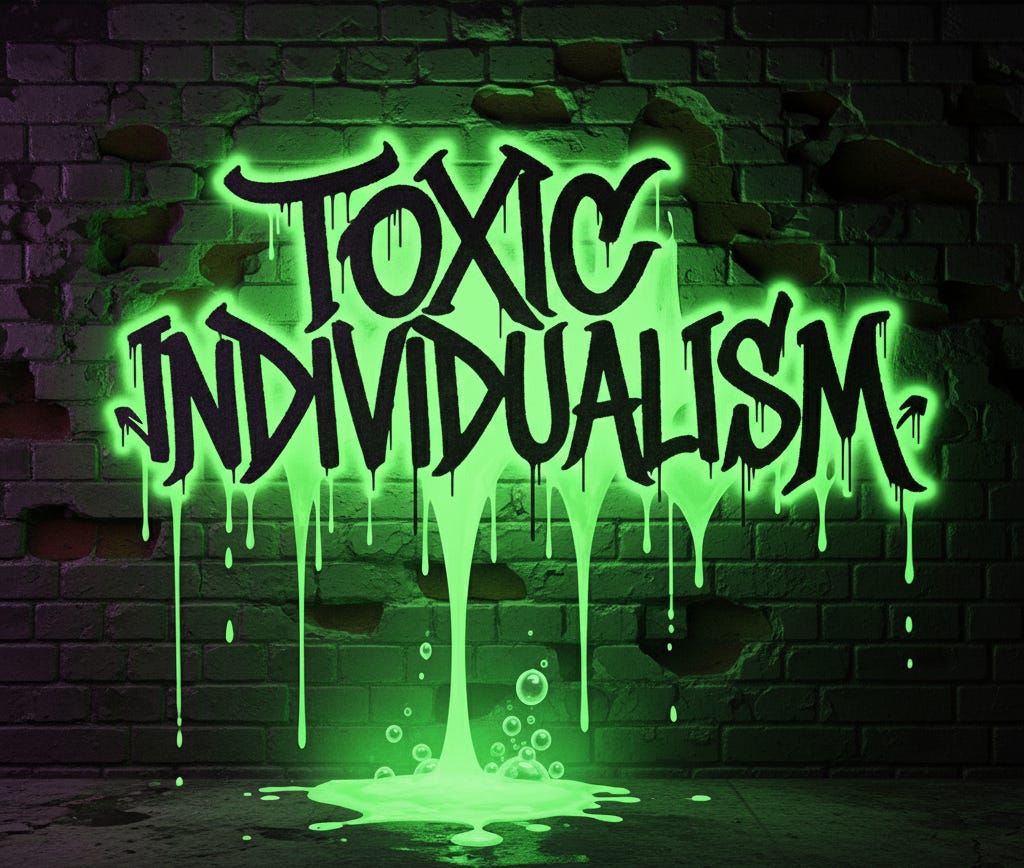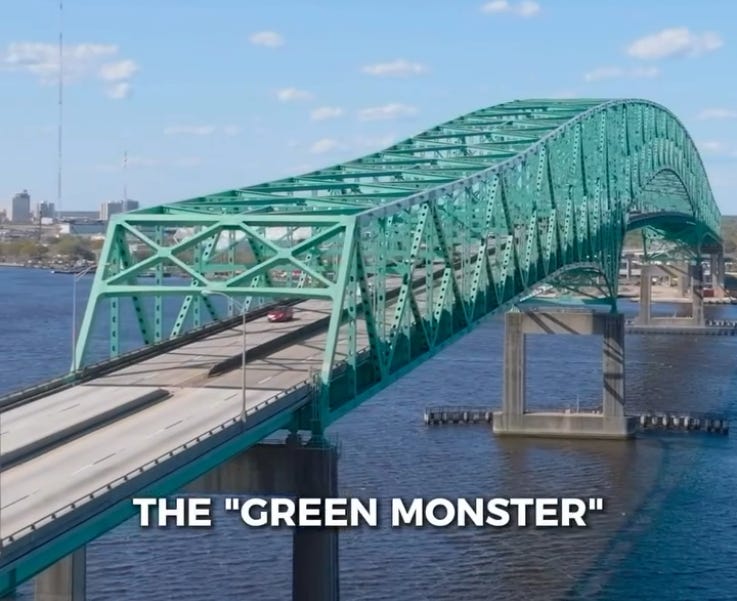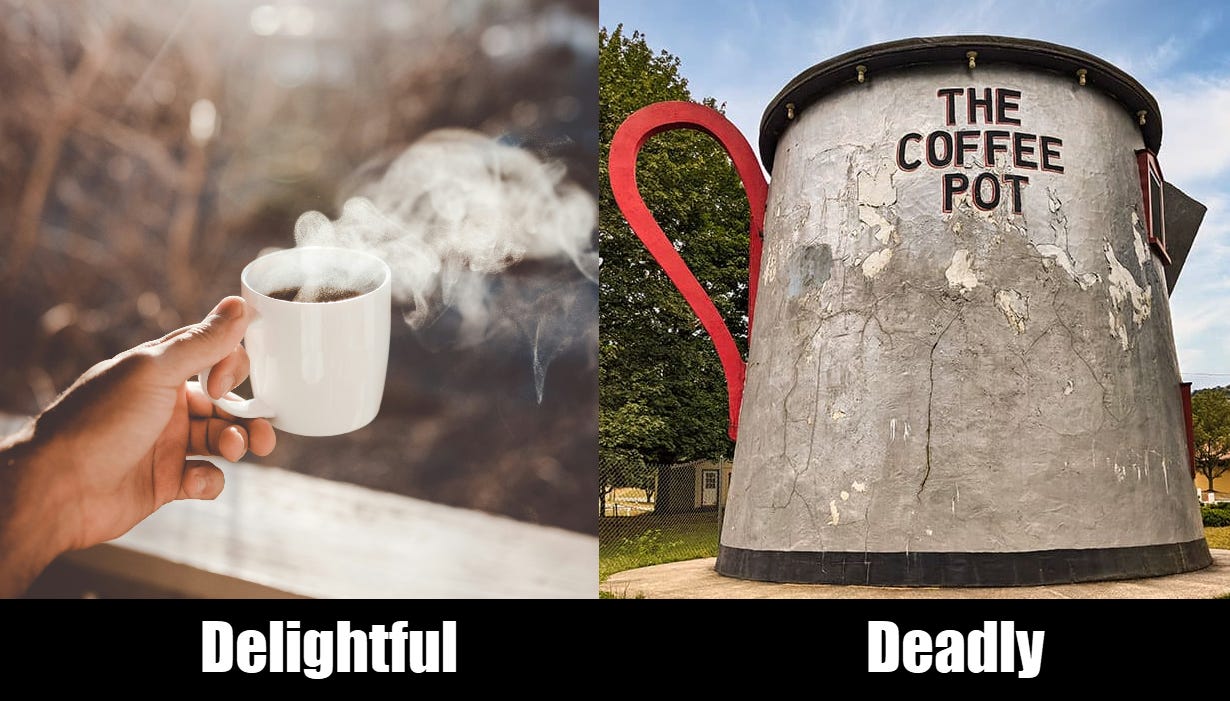Toxic Individualism
The Dose Makes the Poison
I am a runner who lives in Jacksonville, FL. Like most big cities, we have a running event that truly marks the end of the annual ebbs and flows in training. It’s not a marathon, like New York, Boston, and Chicago. We ain’t basic like that.
No, our annual signature race is a 15K (9.33 miles in freedom units). Not any 15K, it is the 15K. The Gate River Run is the largest 15K race in the country, and since 1994 it has also been the 15K US National Championship.
Yes, the 15K US National Championship is a thing. And so are 15K races. 5K’s are for quitters. I said what I said.
Every signature race has a signature feature. The Boston Marathon has Heartbreak Hill in mile 21. For the Gate we have the Hart Bridge, an emerald cantilever bridge rising 140 feet above the Saint John’s River.
To the runners it goes by a different name.
The Green Monster.
You begin Mile 8 on approach to the bridge, with the final mile of the race beginning at the peak. To get there, you need to run 3/4 of a mile up an average grade of 3.5%, with some segments being as high as 13%. It’s where your race day PR goes to die.
Climbing the Green Monster is a test of you as an individual. Did you train enough on hills? Are your legs strong enough to keep churning? Did your hydration and nutrition plans leave you with enough fuel in the tank? You’ll know the answer to all three before you reach the top.
Despite being surrounded by thousands of other runners, as your quads ache and your lungs burn it is your challenge, and yours alone. No one is carrying you to the top. The only person you can rely on is yourself.
Not unlike achieving the American Dream. That is the foundational myth of our nation. Not a specific group of people, not a singular origin tale, no. The core of what makes an American is the idea that each of us through shear will, determination, and hard work, can achieve success in this land of opportunity.
Rugged Individualism
But while your effort, your sweat, your glycogen will power you to the top of the Monster, it is not those alone that get you there.
For weeks preparations have been underway, overseen by an army that swells to over 1,000 people by race day. Police block the on-ramps to the bridge, normally a key traffic artery into downtown Jacksonville. Volunteers at the last water station before the ascent hand out gallons of water to parched runners. Music is blasted over loudspeakers for those sociopaths who chose to raw dawg the race with no earbuds. And photographers at the pinnacle stand ready to capture your achievement as you crest the top and begin the triumphant final mile to the finish line.
Yes, it takes hard work and dedication to vanquish the Green Monster. No one is going to run it for you. But hundreds of people have worked to pave the way for you. Some literally paved the way for you.
Imagine having to contend with traffic while scaling a 13% incline. Or not having a single cup of water offered to you over sixty to ninety minutes, or more, of running.
It is so easy to see our achievements as solely our own and miss the web of humanity that makes them possible.
To frame ourselves as individual achievers we are made blind to our collective reality by a powerful myth. The American Dream©, powered by Rugged Individualism™. Branding. Marketing schlock used to sell SUV’s, McMansions, and 75” TV’s affixed to every wall.
It is true that individual freedom is a cornerstone of the American experience. No law tells you what, or even if, you worship. Protesting and dissent are considered patriotic duties, not just rights. We allow the expression of the sacred and profane. And all of these are enshrined in our foundational governing document, the US Constitution.
But the Rugged Individualism we are sold tells a lie. It says that each of us alone gets precisely what we have earned. It dismisses the idea that some start further ahead than others. It ignores the obstacles placed for some but not all. And it denies the impact of systems larger than all of us.
To make moral choices, one must have the freedom to choose. And we think that in America we have absolute freedom to choose anything except the most extremely abhorrent. And if someone is successful, then they made good choices.
And if someone is sleeping on the street, then they have made poor choices. Their outcome is solely their fault.
It is this thinking that lets us walk by them, annoyed at their presence instead of shamed for participating in a system that allows it to happen.
It is here where see Rugged Individualism for what it truly is. Toxic Individualism.
It poisons our ability to band together. It corrodes empathy. It is the darkness where the collective good of our society decays into rot.
In a world that pushes us toward easy answers, choosing to think deeply is an act of rebellion. My weekly newsletter, Radical Kindness, is your toolkit for that rebellion. We trade academic theory for real-world frameworks you can use to make clearer, more compassionate decisions. Join the rebellion.
This isn't to say that individualism itself is inherently evil. Rather, it's a question of dosage. As the 16th-century physician Paracelsus famously wrote:
'Sola dosis facit venenum': The dose makes the poison.
Caffeine acts as a pesticide in plants. 80 to 100 milligrams of it in your morning coffee is a nice boost of alertness to start your day. But 20 grams of caffeine is toxic enough to end your life.
Individualism too is a stimulant for society. American innovation in art and science has been a boon to humanity, often powered by people who refused to conform. Benjamin Franklin. Katherine Johnson. Robert Goddard. Hedy Lamarr. Elvis.
Of course, the proponents of this rugged ethos will argue that it is the very engine of American prosperity. They will claim that competition is what drives innovation, that the fear of failure is a necessary motivator, and that social safety nets breed dependency and stifle ambition. They paint a world where helping another is to cripple them, a well-intentioned but ultimately destructive act. But this view relies on a false premise: that life is a simple, fair race where everyone starts at the same line with the same equipment. It fundamentally misunderstands the difference between a hand-up and a handout.
But what has been empowering in the right dose has become stifling. It has become too easy to see people barely making ends meet working multiple jobs and decide that they should’ve gotten better jobs. To read about someone bankrupted by medical debt after fighting cancer and just be glad you have employer provided health insurance. To see generations of poverty calcified by our systems and believe those people just didn’t work hard enough.
Instead we cling to the little piles of what we’ve been able to accumulate and selfishly protect it, because according to Rugged Individualism the net on my paycheck equates to my value as a person.
After all, I earned it.
Why should I give up anything for someone who didn’t work as hard as me?
Rugged Individualism blinds us to the people who helped us along the way.
Rugged Individualism ignores the fact that some went to better schools with full bellies provided by loving parents while others learned from out-of-date textbooks and underpaid teachers.
Rugged Individualism says that there is nothing we can do about full time jobs that don’t pay enough to cover a minimum standard of living, so I better make sure I don’t have one of those jobs. Despite the fact that if the jobs exist that implies that they need to be done.
Rugged Individualism ignores the fact that cancer or car accident can happen to anyone, regardless of job we have and the benefits it affords.
Rugged Individualism tricks us into thinking life is a zero-sum game and to help another is to choose to lose.
But when we begin to track our credits and debits in the Ledger, those lies are exposed. When we start to look at our life through clear eyes and reckon with our place, we can start to see that any individual achievement was enabled by the help of many.
We can choose whether to compete, or to cooperate. In America we enjoy living in the most materially affluent society in human history. So wealthy that the fact that we have homeless people, people who work as hard as possible and barely make ends meet, unequal access to education and healthcare, all of these are choices.
Not choices of any individual. But choices of a society who only sees themselves as individuals. Our systems produce these results. But systems are designed and made up of people.
This isn't a problem of scarcity; it is a problem of priorities. We are told we cannot afford to solve these issues, yet we make choices that prove otherwise. The United States chose to fund a new Ford-class aircraft carrier at a cost of over $13 billion. This is a sum that, according to the Department of Housing and Urban Development, could effectively house tens of thousands.
We are told that 'free college' is an untenable fantasy, yet a 2020 Georgetown University study1 priced a comprehensive ten-year plan at around $800 billion. This figure is dwarfed by the choice we made to pass tax cuts in the “One Big Beautiful Bill”, which will reduce federal revenue by an estimated $4.5 trillion over that same period. The money is there. We have simply chosen to believe that some things, and some people, are not worth the investment.
We are all complicit in this system. We all participate. Thus, we can change it.
I know it seems big. Too big for any one person to tackle. It is true that no one person can change the nation overnight, but like all big things they have to start somewhere.
What can I do? What can you do? We can begin by seeing the struggles of others. We can begin by seeing ourselves. And we can begin by seeing sum of all of us together not as competitors scrambling to get our little slice of the American Dream, but as collaborators lifting all, together.
We see our lives as a zero-sum race against one another, a frantic scramble to the top of the Monster. But what if we saw it differently? What if we understood that society is not a race, but a team sport? Our goal shouldn't be to get our personal record while others collapse from exhaustion behind us. It should be to get everyone across the finish line. Imagine what can be accomplished by 340 million people, running together, ensuring no one is left behind on the climb. That is an America we can make a reality.
If you're ready to explore practical philosophy for everyday ethical decisions, without the academic jargon, subscribe to Radical Kindness: Empathy as Rebellion. Every week, I share frameworks for navigating moral complexity, personal stories of growth through adversity, and tools for building a more ethical life.
Join a growing number of thoughtful readers who are figuring out how to be good humans in a complicated world.
Carnevale, Anthony P., Jenna R. Sablan, Artem Gulish, Michael C. Quinn, and Gayle Cinquegrani. (2020). The Dollars and Sense of Free College. Georgetown University Center on Education and the Workforce.






Very well put! Another inspiring read :)